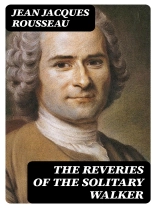In ‘The Reveries of the Solitary Walker, ‘ Jean Jacques Rousseau presents a profound exploration of solitude and self-reflection through a series of contemplative essays. Written in the latter years of his life, this work embodies Rousseau’s lyrical style and philosophical inquiries, weaving together themes of nature, identity, and the essence of human experience. The narrative reflects the Enlightenment’s preoccupation with individualism, yet it uniquely diverges into a deep personal journey, serving both as a philosophical treatise and a richly textured memoir of his walks through nature and his inner thoughts. Rousseau, a seminal figure in the Enlightenment, grappled with concepts of society, education, and human emotion throughout his life, often finding himself at odds with the conventions of his time. His exile and continuous search for belonging and authenticity heavily informed the reflective tone of this work, showcasing his belief in the transformative power of nature and solitude. The reveries allow a glimpse into his soul, capturing the tension between societal expectations and personal freedom. This book is highly recommended for readers interested in philosophical literature and the human condition. Rousseau’s eloquence invites readers to join him on his introspective journey, encouraging a dialogue between the self and the world, making it an essential read for anyone seeking to understand the complexities of solitude and enlightenment.
Про автора
Jean-Jacques Rousseau (1712–1778) was a towering figure in the Enlightenment, an era characterized by an explosion of philosophical and intellectual activity in Europe. Of Genevan origin, Rousseau’s writings touched on a vast spectrum of human inquiry, ranging from educational theory to political philosophy. Among his most significant contributions is ‘The Social Contract’, often cited alongside ‘Èmile, or On Education’ for their revolutionary views on political organization and child-centered learning. Yet, it is in his final book, ‘The Reveries of the Solitary Walker’ (Les Rêveries du Promeneur Solitaire), published posthumously in 1782, that Rousseau offers an introspective journey into his own thoughts and feelings as he confronted the ramifications of his personal life and his interactions with contemporary society. This work provides profound insights into his philosophical musings, his own emotional landscape as well as his stylistic mastery in merging personal reflections with broader human experiences. Rousseau’s literary style is characterized by its earnestness and direct appeal to the reader’s emotions, a preference for evocative imagery that reveals universal truths about human nature. His influence has been enduring, growing to represent a significant benchmark not only in Western philosophy but also in literature and the shaping of modern political thought.












